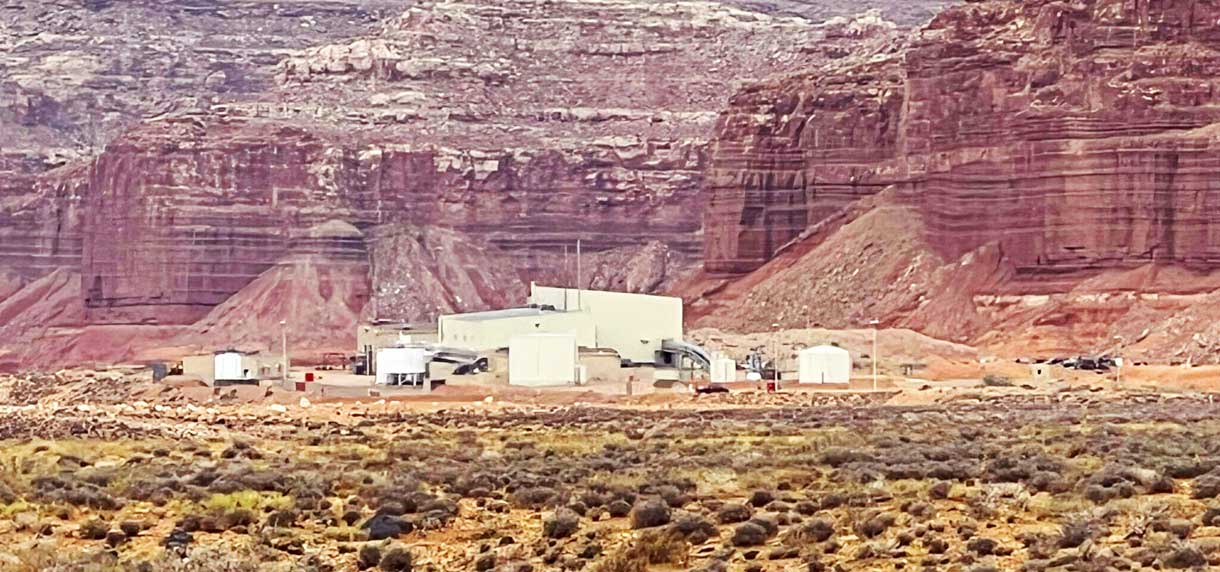
An ore conveyor sits ready to resume operation at Anfield Energy’s Velvet-Wood Mine in the Lisbon Valley of Eastern Utah. The Department of Interior completed an environmental review of the operation in record time and gave a green light for mining operations to begin. Photo courtesy Anfield Energy.
John Rogers
Salt Lake Business Journal
The U.S. Department of Interior has approved the reopening of a uranium mine in the Lisbon Valley, about 30 miles from Monticello in San Juan County.
On May 23, the DOI announced the approvals for Canadian-based Anfield energy to operate the Velvet-Wood Mine off Williamson Fork Road in the far-eastern part of the county near the Colorado border.
The approval came just 11 days after the department announced the use of emergency procedures as part of a national energy emergency declared by Pres. Donald Trump on Jan. 20, aimed, in part, at decreasing reliance on foreign energy.
The result was an accelerated environmental review by the Bureau of Land Management (BLM) with a completion timeline of 14 days. That accelerated review led to approval of the mine operation. BLM completed its assessment early, paving the way for mining operations to begin. The Velvet-Wood project was the first in the nation to undergo the Trump-ordered accelerated review process. Industry sources told the Business Journal that a normal timetable for an environmental assessment of a new mine by the federal government is at least a year and has taken as much as five years in the past.
The Velvet-Wood project aims to produce uranium, which is used as a fuel in nuclear power plants, as well as vanadium, used in the production of steel alloys. It is being built on the site of an older mine that closed in the 1980s. Anfield also plans to restart its Shootaring Canyon uranium mill, 45 miles south of Hanksville in Wayne County — one of only three licensed, permitted and constructed conventional uranium mills in the country — to extract uranium from Velvet-Wood ore.
Environmental groups have raised concerns about completing the National Environmental Policy Act review (NEPA) in under two weeks. NEPA processes typically include analysis of potential impacts on the project environment, alternatives to consider and any mitigation of impacts on public lands including watersheds. The process also usually includes opportunities for public participation in the form of comments and sometimes hearings. According to BLM documents, public input was not required because of the president’s emergency order.
“This approval marks a turning point in how we secure America’s mineral future,” said Secretary of the Interior Doug Burgum. “By streamlining the review process for critical mineral projects like Velvet-Wood, we’re reducing dependence on foreign adversaries and ensuring our military, medical and energy sectors have the resources they need to thrive. This is mineral security in action.”
According to data from the U.S. Energy Information Administration and published by Anfield, U.S. commercial nuclear reactors have almost complete reliance on foreign imports of uranium. While it varies year to year, from 2019 to 2023 nearly half of U.S. uranium came from Canada and Australia, with Russia, Kazakhstan and Uzbekistan making up most of the rest of imported uranium for commercial nuclear reactors.
“The Velvet-Wood project will bring new jobs and infrastructure to the area, reopen and expand the existing underground mine and restore the land once mining is finished,” the DOI said. “Most of the work will take place underground, targeting known mineral deposits left from earlier operations.”
Anfield reported that between 1979 and 1984, the Velvet mine produced 4 million pounds of uranium and 5 million pounds of vanadium. While the Velvet project could include opening of existing declines and vents, the Wood area of the project has not been mined but is adjacent to the Velvet project.
“We are very pleased that the Department of the Interior has greenlit our Velvet-Wood project in an expedited manner,” said Corey Dias, CEO of Anfield Energy. “This confirms our view that Velvet-Wood was well-suited for an accelerated review, given that it is a past-producing uranium and vanadium mine with a small environmental footprint. The company will now pivot to advancing the project through construction and, ultimately, to production.”







